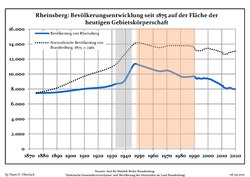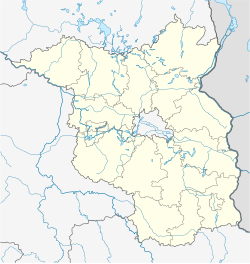Rheinsberg
Rheinsberg | |
|---|---|
 Schloss Rheinsberg | |
 Coat of arms | |
show Location of Rheinsberg within Ostprignitz-Ruppin district | |
 Rheinsberg | |
| Coordinates: 53°5′54″N 12°53′45″E / 53.09833°N 12.89583°ECoordinates: 53°5′54″N 12°53′45″E / 53.09833°N 12.89583°E | |
| Country | Germany |
| State | Brandenburg |
| District | Ostprignitz-Ruppin |
| Subdivisions | 17 Ortsteile |
| Government | |
| • Mayor (2017–25) | Frank-Rudi Schwochow[1] |
| Area | |
| • Total | 324.83 km2 (125.42 sq mi) |
| Elevation | 61 m (200 ft) |
| Population (2020-12-31)[2] | |
| • Total | 7,948 |
| • Density | 24/km2 (63/sq mi) |
| Time zone | UTC+01:00 (CET) |
| • Summer (DST) | UTC+02:00 (CEST) |
| Postal codes | 16831 |
| Dialling codes | 033931 |
| Vehicle registration | OPR |
| Website | www.rheinsberg.de |
Rheinsberg (German: [ˈʁaɪ̯nsˌbɛʁk] (![]() listen)) is a town and a municipality in the Ostprignitz-Ruppin district, in Brandenburg, Germany. It is located on lake and the river Rhin, approximately 20 km north-east of Neuruppin and 75 km north-west of Berlin.
listen)) is a town and a municipality in the Ostprignitz-Ruppin district, in Brandenburg, Germany. It is located on lake and the river Rhin, approximately 20 km north-east of Neuruppin and 75 km north-west of Berlin.
History[]

Frederick the Great, while still Crown Prince, designed and moved into a restored chateau in Rheinsberg shortly after his 1733 marriage to Elisabeth Christine of Brunswick-Bevern. Here he experienced his "Rheinsberg Period", an era marked by regular correspondence with Voltaire, boisterous celebration in the company of minor philosophers and musicians, and the writing of several works of political theory, including the Anti-Machiavel.[3]
In 1870, the painter Eduard Gaertner and his family decided to leave the hectic atmosphere of Berlin and settle in Flecken Zechlin, a suburb of Rheinsberg - where he lived until his death in 1877.
Rheinsberg is the location for Kurt Tucholsky's Rheinsberg, a 1912 picture book for lovers based on an autobiographical weekend trip.
Demography[]

Development of population since 1875 within the current Boundaries (Blue Line: Population; Dotted Line: Comparison to Population development in Brandenburg state; Grey Background: Time of Nazi Germany; Red Background: Time of communist East Germany)

Recent Population Development and Projections (Population Development before Census 2011 (blue line); Recent Population Development according to the Census in Germany in 2011 (blue bordered line); Official projections for 2005-2030 (yellow line); for 2014-2030 (red line); for 2017-2030 (scarlet line)
|
|
|
Geography[]
Lakes[]
Photogallery[]

Monument opposite castle

Castle seen from monument place

Concerthall (part of the castle)

Church in Dierberg

Fire engine house in Heinrichsdorf
Twin towns[]
 Huber Heights (Ohio, USA)
Huber Heights (Ohio, USA)
People from Rheinsberg[]
- Gad Granach (1915–2011), German writer
- Erhard Egidi (1929–2014), German cantor, composer and organist
- Lothar Baumgarten (1944–2018), German artist
References[]
- ^ Landkreis Ostprignitz-Ruppin Wahl der Bürgermeisterin / des Bürgermeisters, accessed 2 July 2021.
- ^ "Bevölkerung im Land Brandenburg nach amtsfreien Gemeinden, Ämtern und Gemeinden 31. Dezember 2020". Amt für Statistik Berlin-Brandenburg (in German). June 2021.
- ^ MacDonogh, Giles (1999). Frederick the Great: A Life in Deed and Letters. New York: St. Martin's Griffin. pp. 98–129. ISBN 0-312-27266-9.
- ^ Detailed data sources are to be found in the Wikimedia Commons.Population Projection Brandenburg at Wikimedia Commons
External links[]
- Official website
 (in German)
(in German)
- Towns in Brandenburg
- Localities in Ostprignitz-Ruppin
- Province of Brandenburg









